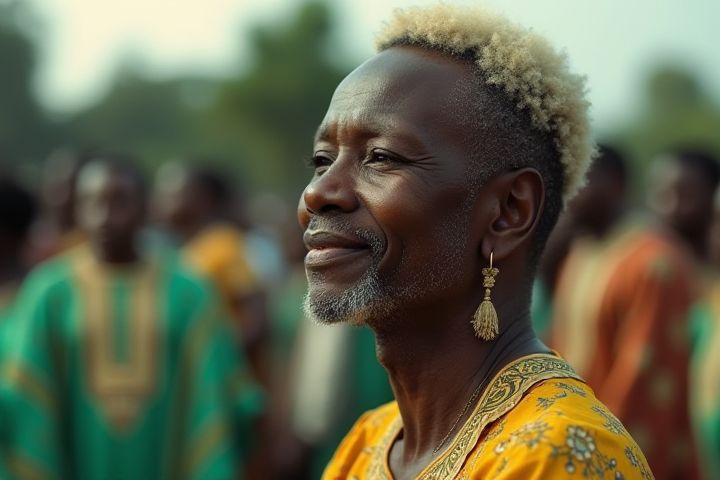
Nigeria operates as a federal democratic republic, established in 1999 following years of military rule. The democratic system is characterized by a multi-party framework, with the two major parties being the All Progressives Congress (APC) and the People's Democratic Party (PDP). Regular elections are held at federal, state, and local levels, allowing citizens to exercise their right to vote for representatives. However, challenges such as electoral violence, corruption, and socio-political instability have raised concerns about the effectiveness and integrity of its democratic processes. Despite these issues, civil society organizations and citizens actively engage in promoting accountability and transparency within the political landscape.
Presidential System
Nigeria operates under a federal democratic republic framework, characterized by a presidential system where the President serves as both the head of state and government. The presidential election is a critical event, held every four years, allowing citizens to actively participate in shaping leadership and governance. This system is designed to ensure a separation of powers among the executive, legislative, and judicial branches, promoting accountability and checks and balances. Voter engagement and political representation are essential elements, reflecting Nigeria's diverse population and regional interests.
Federal Republic
Nigeria operates as a Federal Republic, characterized by a division of powers between the national government and 36 state governments. This political system supports a multi-party framework, allowing diverse representation of its over 200 ethnic groups. Nigerian democracy emphasizes electoral processes, with citizens participating in regular elections for local, state, and federal positions. The interplay between federal and state jurisdiction is essential in addressing regional issues while maintaining national unity.
Three Branches: Executive, Legislative, Judicial
Nigeria's democracy is structured around three distinct branches: the Executive, Legislative, and Judicial. The Executive, headed by the President, is responsible for implementing laws and managing the country's day-to-day affairs. The Legislative branch, composed of the National Assembly, includes the Senate and House of Representatives, tasked with law-making and representing the interests of citizens. The Judicial branch upholds the rule of law by interpreting laws and ensuring justice, with the Supreme Court serving as its highest authority.
Multi-Party System
Nigeria operates a multi-party system, which allows for various political parties to participate in the democratic process. The major parties include the All Progressives Congress (APC) and the People's Democratic Party (PDP), contributing to a dynamic political landscape. This system enables citizens to choose from multiple candidates during elections, promoting political pluralism and representation. However, challenges such as election violence and corruption continue to affect the effectiveness of the democratic process in Nigeria.
National Assembly: Senate and House of Representatives
Nigeria's democracy is characterized by a bicameral legislature comprising the Senate and the House of Representatives, which together form the National Assembly. The Senate, with 109 members, represents Nigeria's geopolitical zones, while the House of Representatives, consisting of 360 members, reflects the population distribution among the states. This dual structure facilitates a system of checks and balances, encouraging diverse representations and policy discussions. Your understanding of this system is essential for grasping the complexities of Nigeria's governance and legislative processes.
Independent Electoral Commission
Nigeria's democracy is significantly influenced by the Independent National Electoral Commission (INEC), which is tasked with overseeing the electoral process. Established to ensure free and fair elections, INEC's responsibilities include voter registration, the management of electoral logistics, and the monitoring of political party activities. The commission's role is pivotal in fostering public confidence in the electoral system, aiming to enhance transparency and accountability. As Nigerian citizens engage in the democratic process, the integrity of INEC determines the overall health and legitimacy of the country's governance.
Presidential Elections Every Four Years
Nigeria's democracy is largely centered around its presidential elections, which occur every four years. These elections are critical for shaping the nation's political landscape and involve a diverse array of candidates representing various political parties. The process is governed by the Independent National Electoral Commission (INEC), which oversees the electoral framework and ensures compliance with legal standards. As a voter, your participation in these elections is vital for influencing governance and contributing to Nigeria's democratic development.
Judiciary: Supreme Court
Nigeria's democracy heavily relies on the judiciary, particularly the Supreme Court, which serves as the highest court in the land. The Supreme Court is responsible for interpreting the Constitution, safeguarding citizens' rights, and ensuring that laws align with democratic principles. By addressing electoral disputes and upholding the rule of law, it plays a crucial role in maintaining the integrity of Nigeria's political system. You can see how the Supreme Court's decisions impact governance and public trust in democratic institutions.
Civil Liberties and Freedoms
Nigeria's democracy faces significant challenges regarding civil liberties and freedoms, including issues related to freedom of speech, assembly, and press. Various laws and regulations, such as the Nigerian Cybercrime Act, can restrict online expression, leading to concerns about censorship and human rights violations. Moreover, ethnic and religious tensions often influence the protection of civil liberties, impacting the quality of governance. You should be aware that while Nigeria has made strides in democratic practices, the enforcement of civil rights remains a critical area needing attention.
Challenges with Corruption and Governance
Nigeria's democracy faces significant challenges related to corruption and governance, undermining its political stability and economic development. Corruption manifests in various forms, including bribery, embezzlement, and lack of transparency, affecting public trust in government institutions. The governance landscape is further complicated by regulatory inefficiencies and a lack of accountability, which stymie effective service delivery. Addressing these issues is crucial for fostering a more resilient democracy that prioritizes the needs of citizens and strengthens the rule of law.
